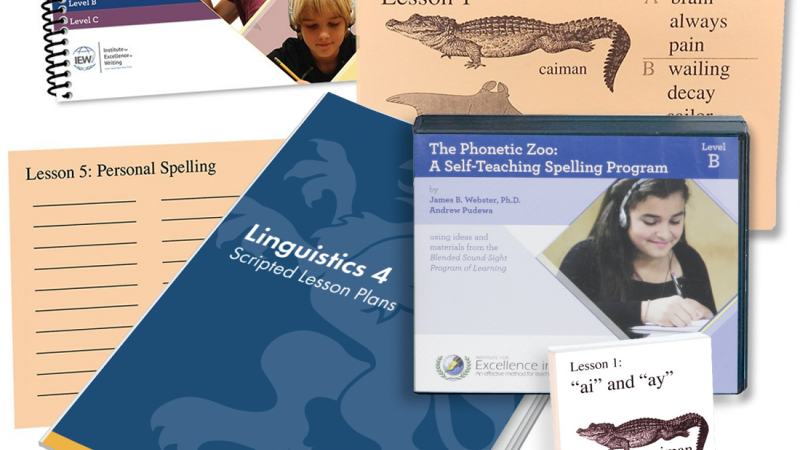The Veritas Approach to Linguistics (& Spelling)

At Veritas, Linguistics includes learning spelling and word roots. It includes an unexpected observation, too, which is this. The ability to spell—probably more than any other academic skill—is a gift from God. Some have it; some don’t. That doesn’t mean we shouldn’t teach it. It means only that we should have realistic expectations.
In the 1980s, it was popular to have children memorize the “look” of whole words rather than learn spelling rules. Classical educators know this makes no sense. English isn’t like Chinese, which doesn’t have an alphabet. Chinese uses a logographic system of symbols to represent words. Memorization is the only option.
The grammar stage provides the opportunity for children to learn tools of learning, including spelling rules. Learning spelling rules proves important for mastery of the English language. Remember “I before E, except after C”?
Students learning English should start with a phonics program like The Phonics Museum. The Phonics Museum introduces basic spelling rules. Upon completion—typically at the end of 1st grade—students are ready to learn more advanced spelling rules. To help students master these rules, The Phonetic Zoo provides three exceptional years that fit well anywhere between 2nd and 5th grades. In the grammar stage, children learn well through repetition. In The Phonetic Zoo, students study the same rules for three years, but they encounter words of increasing difficulty. The curriculum’s multisensory approach allows children to hear, see, and feel (write) the rules.
Each lesson presents a rule, jingle or hint and 15 words that either follow the rule or break it. Flashcards with animals and animal names can be used for visual reinforcement. Every fifth lesson is a personalized spelling test using words from the student’s own writing or vocabulary. Students learn independently. They listen to a CD (headphones are helpful) and practice a ten-minute lesson each day. They practice again and again until a perfect score is achieved. With the repetition of auditory input, this classical approach is the best way for most children to learn spelling rules and vocabulary.
| Grade | Course Options | Curriculum |
|---|---|---|
2-3 | You Teach | The Phonetic Zoo, Level A, B |
4-5 | You Teach, Live | The Phonetic Zoo, Level B, C |
6 | You Teach, Live | Vocabulary from Classical Roots A |
In 6th grade, students move on to study word origins using Vocabulary from Classical Roots. Students learn to unlock the meaning of words by looking at their Greek and Latin roots. This word-root approach to vocabulary development prepares students to read impressive works. It equips them to master far more word meanings than what’s typical for their grade level. As with spelling, why ask students simply to memorize word meanings? Better to give them tools to ascertain word meanings by their roots.
Learn more about the course options for Linguistics!







